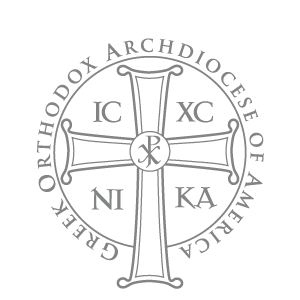Visitors
Welcome to the website of St. George Greek Orthodox Church! We are an Orthodox Christian community with members of many different nationalities, from all walks of life and ages, located in Fresno, California.
As a visitor to St. George, we want you to be as comfortable as possible during your visit with us. This section covers some of the questions you may have as a newcomer. Our clergy are also available to answer any questions you may have about Orthodox Christianity.
Are non-Orthodox Visitors Welcome?
Yes! Our community includes many converts to the Orthodox Church, and we welcome newcomers, and visitors. The Orthodox Church includes faithful from all racial, age, ethnic, and economic backgrounds. Don’t be afraid to ask questions about what we do and why. Our bookstore also has books that can help answer a questions about the Orthodox faith, Christian church history, theology, catechism, Orthodox spirituality, inspiration, prayer, and the lives of the Saints. Our bookstore is open Sundays following services.
What to Expect?
As you enter the church building, you will find yourself in the Narthex. If you visit on a Sunday, a Parish Council member will be there to greet you, and help you navigate your way around. From the Narthex, you’ll enter the church nave, the sacred space where the congregation worships. Our normal Sunday service times are, Orthros (Matins- Morning Prayers) at 8:30am and the Divine Liturgy of Saint John Chrysostom at 9:30am, which is the liturgical service followed by all Orthodox Churches worldwide.
Following the Sunday Divine Liturgy, you are invited to join us for a “coffee hour” which is a good time to get to know our parish members and meet our clergy.
Will anything be asked of me during the service?
No. At Saint George, we do not ‘pass the plate’. We do not have ‘altar calls’. Please be aware that Orthodox priests may only serve the Holy Eucharist to baptized members in good standing of the canonical Orthodox Church, who have recently confessed, and fasted before partaking of the Holy Eucharist. This is the ancient tradition of the Holy Church for nearly 2,000 years of its history. The Orthodox Church understands the Holy Eucharist as a mystery of the real presence of Christ in the Eucharist, not simply as a memorial, or merely in a spiritual sense, as many other non-Orthodox Christians do. Rather than trying to accommodate to often varying “interpretations” or revisions of this and other doctrines of the ancient faith, we simply ask that you respect the ancient, apostolic tradition and join us in receiving a piece of Fellowship bread at the veneration of the cross, at the end of the Divine Liturgy. Partaking of the Fellowship bread is an expression of friendship – it is not the Eucharist.
How long are the services?
Orthros also called Matins (Morning prayers – Sunday mornings at 8:30 A.M., preceding Divine Liturgy) averages 60 minutes in length.
Divine Liturgy (Sunday – 9:30 A.M.) runs about ninety minutes.
Is there a dress code?
The general rule for men and women is to dress appropriately, modestly and respectfully, because we stand before the living God. We ask, however, that you do not wear shorts, mini-skirts, tank tops, low-cut or strapless dresses (unless covered by a sweater, etc.). Some Orthodox women wear head coverings, but this is not required. Men are asked not to wear head coverings (baseball caps, etc.) in the nave.
Is childcare provided?
Each parent is responsible to take care of their child. We encourage children to be present in Church for the services. This participation is part of a child’s spiritual formation. As a matter of courtesy and respect for the other worshippers, if your baby or child gets fussy, talkative, or has a meltdown, please take him or her out of the nave until he or she is ready to return quietly.
Lighting candles?
Lighting candles is an important part of Orthodox worship and piety. We light candles as we pray, making an offering to God accompany our prayers. Orthodox typically light candles when coming into the church, but there are times when candles should not be lit. Candles should not be lit during the Epistle or Gospel readings, during the Little Entrance, and during the sermon. By the way, you do not have to be an Orthodox Christian to light a candle and pray in an Orthodox church.
Can non-Orthodox receive the Holy Eucharist?
Orthodox priests may only serve the Holy Eucharist to baptized members in good standing of the canonical Orthodox Church, who have recently confessed, and fasted before partaking of the Holy Eucharist. This is the ancient tradition of the Holy Church for nearly 2,000 years of its history. The Orthodox Church understands the Holy Eucharist as a mystery of the real presence of Christ in the Eucharist, not simply as a memorial, or merely in a spiritual sense, as many other non-Orthodox Christians do. We simply ask that you respect the ancient, apostolic tradition and join us in receiving the Fellowship bread at the veneration of the cross, at the end of the Divine Liturgy. Partaking of the Fellowship bread is an expression of friendship – this is not the Eucharist.
What is Orthodox worship music like?
Close to seventy-five percent of an Orthodox service is sung. New visitors will find there are many new things to experience in a Holy Orthodox Church service. Feel free to go at your own pace, ask any questions you want, and know you are most welcome to “come and see”.
What if I have further questions?
If you have further questions, feel free to contact the church office by phone at 559-233-0397 or by email at sggoc@comcast.net. You can also speak with one of the clergy during coffee hour.
